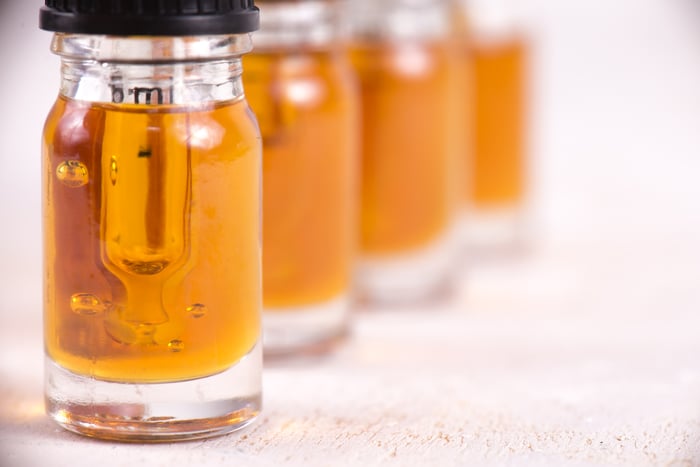When the curtain closes on 2018, Wall Street and investors are likely to look back and proclaim this the best year ever for the marijuana industry. Although pot stocks didn't come anywhere near matching the percentage gains they experienced in 2016 or 2017, they did gain validity, which is much more important over the long run.
On Oct. 17, Canada became the first industrialized country in the world to legalize recreational weed. In doing so, it opened the door to what could be $5 billion in added annual sales by sometime early next decade.
Additionally, we've witnessed expansion in the United States, with two new states legalizing medical cannabis during midterm elections, and both Vermont and Michigan allowing adult-use pot (although Vermont is the only one of 10 legalized recreational marijuana states that won't allow retail sales).

Image source: Getty Images.
Marijuana stocks and their smoke-and-mirrors "profits"
It's been a year of transition for investors, too. Having moved beyond the promises stage, Wall Street and investors are now waiting on the marijuana industry to deliver tangible sales growth and profits. In other words, earnings actually matter now.
As earnings season begins to wind down, the fact of the matter is that things weren't very pretty, at least on an operating basis. The seven largest projected growers by annual yield combined to lose nearly $300 million (388 million Canadian dollars) in their recently reported quarter. This included mammoth operating losses of CA$214.6 million from Canopy Growth and CA$111.9 million from Aurora Cannabis. As pot stocks focus on capacity expansion, brand building, acquisitions, and laying their international sales infrastructure, costs are expected to remain high (pun fully intended).
The thing is, some marijuana stocks, like Aurora Cannabis, have benefited from a variety of one-time benefits, tied either to the disposition of assets, such as stock owned in other pot companies, or fair-value adjustments to their biological assets (i.e., cannabis plants).
You see, under International Financial Reporting Standards (IFRS), cannabis plants fall under "agriculture" and thus these pot stocks are required to constantly revalue their crop throughout its grow cycle. These companies are also responsible for predicting their selling costs of cannabis prior to even harvesting their crop. Needless to say, it leads to a lot of interpretation and, at least in the early going, it's created an artificial (but fully legal) above-the-line lift in gross and net income for most marijuana stocks.

Image source: Getty Images.
Surprise! These pot stocks delivered a legitimate quarterly profit
But the reality is that this isn't a "real" profit. If these one-time benefits are stripped out, a majority of pot stocks would have lost money on an operating basis. There are, however, three marijuana stocks that produced a legitimate profit in their recently ended quarter.
Innovative Industrial Properties
Being profitable should come as little surprise to shareholders of Innovative Industrial Properties (IIPR -0.92%). This medical cannabis-focused real estate investment trust (REIT) has been consistently profitable for a couple of quarters now.
The company's business model of purchasing medical cannabis growing and/or processing facilities and then leasing them back to operators for a period of 15 to 20 years creates a steady and predictable stream of cash flow. Not to mention that Innovative Industrial Properties also has annual rental increases and a 1.5% management fee built into its long-term lease contracts, ensuring it stays ahead of the inflation rate.
Having ended the previous fiscal year with five managed properties, the company now boasts a portfolio of 10 leased properties. Although it's not generating a lot of revenue -- $3.93 million in the third quarter -- the relatively low fixed costs of operating a REIT have allowed it to be healthfully profitable ($0.38 in adjusted funds from operations per share). In fact, since REITs are required to pay out a majority of their earnings to shareholders in the form of a dividend to avoid normal corporate income tax rates, the company recently upped its quarterly payout by 40% to $0.35 a share. Extrapolated out over the full year, this would translate into a nearly 3% yield.
With an abundant amount of cash on its balance sheet, look for the company to add new properties in the quarters to come.

Image source: Getty Images.
Trulieve Cannabis
Perhaps one of the biggest surprises, especially if you don't follow the marijuana industry all that closely, is that a vertically integrated dispensary is already profitable. Traditionally, this is an industry with high up-front costs associated with store construction, remodeling, and marketing. Nevertheless, it hasn't stopped Trulieve Cannabis (TCNNF 10.28%) from reporting a quarterly profit.
As of this very moment, Florida's medical marijuana market represents Trulieve's entire world. It recently opened up its 22nd location within the Sunshine State, albeit two acquisitions announced in early November put Trulieve on track to enter California and Massachusetts. Massachusetts began selling recreational weed a little more than a week ago and could grow into a $1.8 billion market, with California having the potential to generate more in annual weed sales than all of Canada.
In its latest quarter, Trulieve Cannabis recognized $28.3 million in sales, which puts it on track for more than $100 million in extrapolated annual sales. What's truly impressive, though, is that cost of goods sold tallied just $8.3 million, with another $8.3 million in standard operating expenses. Even without the impact of IFRS accounting, Trulieve was very nicely profitable, and has consistently been so throughout the first nine months of 2018.
As a note of caution, understand that its costs could rise substantially as it aims to establish itself in California and Massachusetts. But for the time being, this profitability is encouraging.

Image source: Getty Images.
Charlotte's Web Holdings
Another under-the-radar pot stock that delivered a third-quarter profit is Charlotte's Web Holdings (CWBHF -2.48%), which only became publicly traded company three months ago.
Charlotte's Web is an interesting company in that it produces a wide variety of cannabidiol (CBD)-based products and sells them in more than 3,000 retail locations throughout the United States. Cannabidiol is the nonpsychoactive component of the cannabis plant that's best known for its perceived medical benefits. CBD is in sort of a gray area in the U.S., with only four states banning the cannabinoid completely, 14 allowing it in select instances, and 32 states having passed broad-based medical marijuana laws. Since CBD is not as tightly regulated as dried cannabis, and most states allow CBD, Charlotte's Web has experienced a pretty rapid ramp up in sales.
In its recently ended quarter, Charlotte's Web reported $17.7 million in sales, up from $11.3 million in the prior-year quarter. After costs of goods sold, and excluding any one-time benefits and reductions associated with IFRS accounting, it netted a gross profit of $13.8 million. With operating expenses of $9.8 million, Charlotte's Web produced an operating profit of about $4 million ($2.5 million including those one-time adjustments).
By no means is Charlotte's Web a cheap stock, but the market for CBD medicines could be enormous within a few years. It's certainly a watchlist-worthy pot stock.





